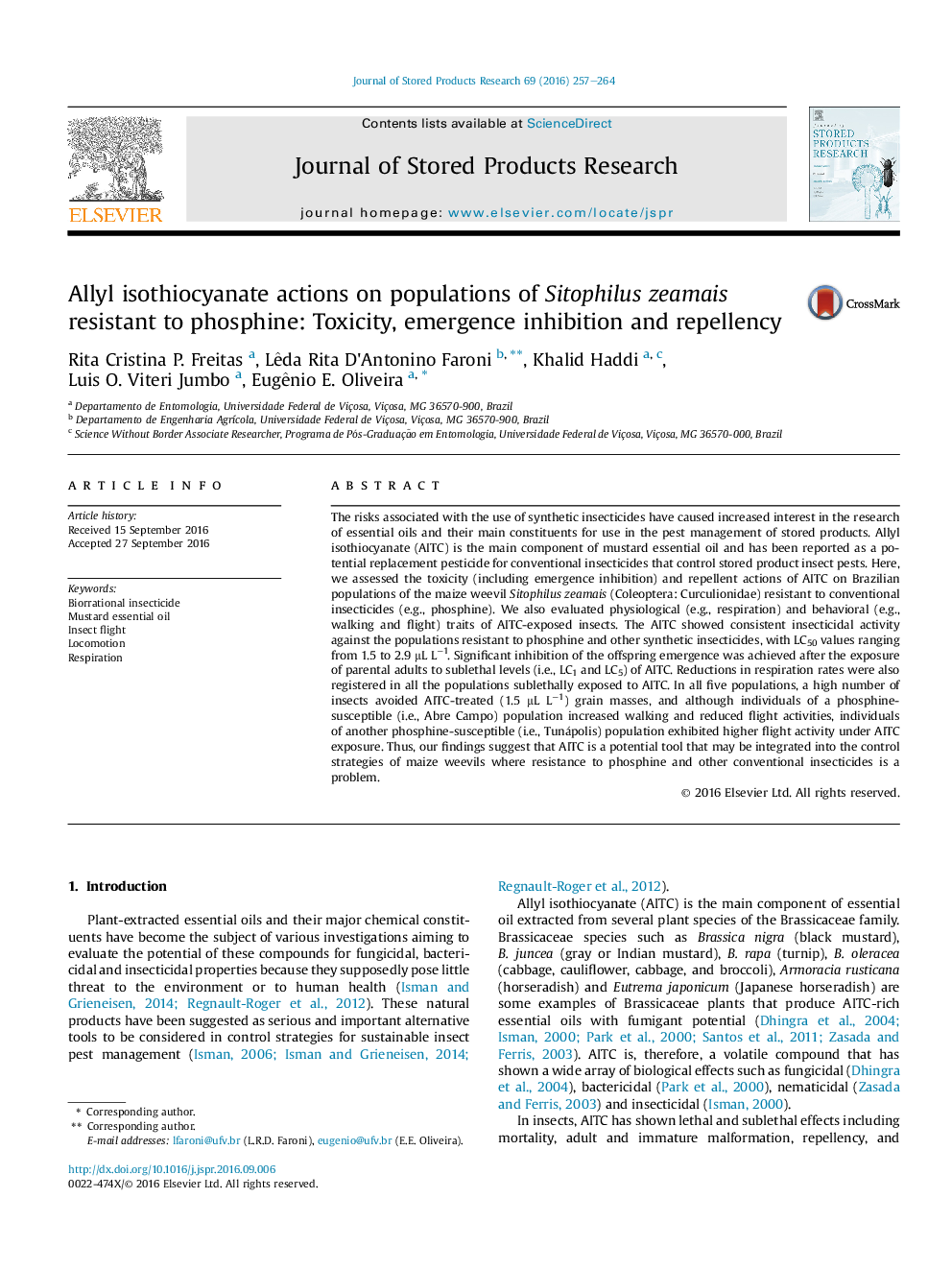| کد مقاله | کد نشریه | سال انتشار | مقاله انگلیسی | نسخه تمام متن |
|---|---|---|---|---|
| 6378373 | 1624920 | 2016 | 8 صفحه PDF | دانلود رایگان |
عنوان انگلیسی مقاله ISI
Allyl isothiocyanate actions on populations of Sitophilus zeamais resistant to phosphine: Toxicity, emergence inhibition and repellency
ترجمه فارسی عنوان
اقدامات ایزوتیوسیانات آللی روی جمعیت سیتوفیلوس زئومای مقاوم در برابر فسفین: سمیت، مهار بازتاب و بازتاب
دانلود مقاله + سفارش ترجمه
دانلود مقاله ISI انگلیسی
رایگان برای ایرانیان
کلمات کلیدی
حشره کش گیاهان دارویی، اسانس خردل، پرواز حشره حرکت تنفس،
موضوعات مرتبط
علوم زیستی و بیوفناوری
علوم کشاورزی و بیولوژیک
علوم زراعت و اصلاح نباتات
چکیده انگلیسی
The risks associated with the use of synthetic insecticides have caused increased interest in the research of essential oils and their main constituents for use in the pest management of stored products. Allyl isothiocyanate (AITC) is the main component of mustard essential oil and has been reported as a potential replacement pesticide for conventional insecticides that control stored product insect pests. Here, we assessed the toxicity (including emergence inhibition) and repellent actions of AITC on Brazilian populations of the maize weevil Sitophilus zeamais (Coleoptera: Curculionidae) resistant to conventional insecticides (e.g., phosphine). We also evaluated physiological (e.g., respiration) and behavioral (e.g., walking and flight) traits of AITC-exposed insects. The AITC showed consistent insecticidal activity against the populations resistant to phosphine and other synthetic insecticides, with LC50 values ranging from 1.5 to 2.9 μL Lâ1. Significant inhibition of the offspring emergence was achieved after the exposure of parental adults to sublethal levels (i.e., LC1 and LC5) of AITC. Reductions in respiration rates were also registered in all the populations sublethally exposed to AITC. In all five populations, a high number of insects avoided AITC-treated (1.5 μL Lâ1) grain masses, and although individuals of a phosphine-susceptible (i.e., Abre Campo) population increased walking and reduced flight activities, individuals of another phosphine-susceptible (i.e., Tunápolis) population exhibited higher flight activity under AITC exposure. Thus, our findings suggest that AITC is a potential tool that may be integrated into the control strategies of maize weevils where resistance to phosphine and other conventional insecticides is a problem.
ناشر
Database: Elsevier - ScienceDirect (ساینس دایرکت)
Journal: Journal of Stored Products Research - Volume 69, October 2016, Pages 257-264
Journal: Journal of Stored Products Research - Volume 69, October 2016, Pages 257-264
نویسندگان
Rita Cristina P. Freitas, Lêda Rita D'Antonino Faroni, Khalid Haddi, Luis O. Viteri Jumbo, Eugênio E. Oliveira,
